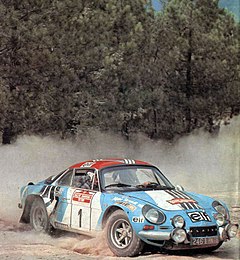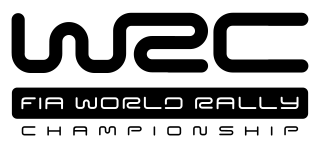
The World Rally Championship is an international rallying series owned and governed by the FIA. Inaugurated in 1973, it is the second oldest of the FIA's world championships after Formula One. Each season lasts one calendar year, and separate championship titles are awarded to drivers, co-drivers and manufacturers. There are also two support championships, WRC2 and WRC3, which are contested on the same events and stages as the WRC, but with progressively lower maximum performance and running costs of the cars permitted. Junior WRC is also contested on five events of the World Rally Championship calendar.
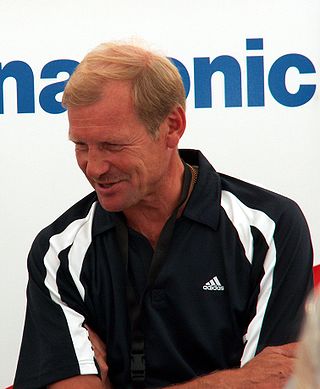
Juha Matti Pellervo Kankkunen is a Finnish former rally driver. His factory team career in the World Rally Championship lasted from 1983 to 2002. He won 23 world rallies and four drivers' world championship titles, which were both once records in the series. Both Sébastien Loeb and Sébastien Ogier have since collected more world titles, but no driver was able to repeat Kankkunen's feat of becoming a world champion with three different manufacturers until Ogier matched this achievement in 2020.
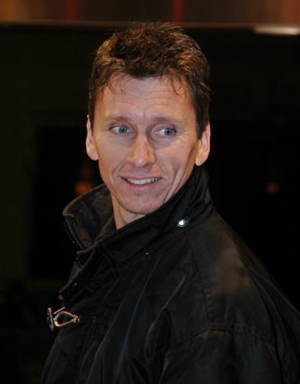
Gilles Panizzi is a French former rally driver.
The 1973 Monte Carlo Rally, run in late January and hosted in the principality of Monaco, was the first rally on the Fédération Internationale de l'Automobile's (FIA) new World Rally Championship (WRC) inaugural season, making it the first ever WRC event to be held.
The 1973 Rallye de Portugal was the third round of the inaugural World Rally Championship season. Run in mid-March in southern Portugal on a mixture of asphalt and gravel, the rally began with a concentration run from a number of European cities, covering about 4,600 km and ending in Estoril, Portugal.
The 1973 Safari Rally was the fourth round of the inaugural World Rally Championship season. Run in mid-April in central Kenya, the Safari was a markedly different rally from the other dates on the WRC schedule. About 5,300 km (3,300 mi) of gravel roads comprised the course, though there were not distinct special stages as in other rallies, but instead the course was uncontrolled. The rally was considered very punishing, and thus many of the successful teams were specifically focused on it, leading to a different set of front-runners than led most other rallies. The rally was won by a local driver, Shekhar Mehta.
The 1973 Rally of Morocco was the fifth round of the inaugural World Rally Championship season. Run in mid-May between Morocco's two major cities, Rabat and Casablanca, the Rallye du Maroc was a very long stage rally covering more than 1200 km on both hard and soft surface roads.
The 1973 Acropolis Rally was the sixth round of the inaugural World Rally Championship season. Run in late-May on the punishing hot gravel roads of central Greece, the Acropolis is a long-standing event on the WRC calendar.
The 1973 Polish Rally was the seventh round of the inaugural World Rally Championship season. Run in mid-July in southern Poland, this marked to only year in which Poland was part of the WRC calendar until 36 years later in 2009. This edition was also notable for the fact that of the 62 teams which began the rally, only three completed it, a record that stands today.
The 1973 Austrian Rally was the ninth round of the inaugural World Rally Championship season. Run in mid-September around Baden, Austria, the rally was entirely on gravel surface special stages. 1973 would be the only year to see the WRC hold an event in Austria, despite the strong presence of Austrian drivers in the series through the present.
The 1973 Press-on-Regardless Rally was the eleventh round of the inaugural World Rally Championship season. Run at the outset of November in Michigan in the United States, the rally was run entirely on gravel.
The 1973 RAC Rally was the twelfth round of the inaugural World Rally Championship season. Run in mid-November in the County of Yorkshire in England, the rally was run primarily on gravel, with some sections of tarmac as well. The rally carried the name of its title sponsor, a popular British newspaper, The Daily Mirror.

The European Rally Championship is an automobile rally competition held annually on the European continent and organized by the Fédération Internationale de l'Automobile (FIA). The championship has been organized since 1953 and has competed in different European countries, alternating between rallies on asphalt and gravel. It was the first supranational rally championship that was organized in the world and therefore the oldest one. In 2012 it had 60 editions and in 2013 it was renewed with the merger with the Intercontinental Rally Challenge.
Rallye Sanremo is a rally competition held in Sanremo, Italy. Except for the 1995 event, the event was part of the FIA World Rally Championship schedule from the 1973 season to the 2003 season. It was a round of the Intercontinental Rally Challenge and is currently a round of the Italian national rally championship.

Alessandro "Alex" Fiorio is an Italian rally driver. He debuted in the World Rally Championship in 1986. Driving the dominant Lancia Delta Integrale for the Lancia "B-team" Jolly Club, he finished third in the drivers' world championship in 1988 and second in 1989. His father Cesare Fiorio was a former racer, the head of Lancia's factory WRC team and sporting director for Scuderia Ferrari.
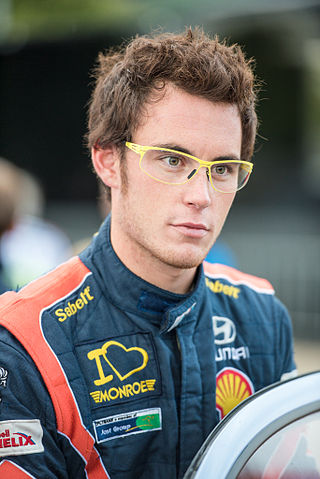
Thierry Jean Neuville is a Belgian rally driver who is competing in the World Rally Championship for Hyundai Motorsport. During his career, he has finished as runner-up in the drivers' championship five times. He helped Hyundai win their first manufacturers' title in 2019, as well as repeating the feat in 2020. His current co-driver is compatriot Martijn Wydaeghe.

Julien Ingrassia is a retired French rally co-driver. Working with Sébastien Ogier, he became World Rally Champion in 2013, 2014, 2015, and 2016 with Volkswagen Motorsport, 2017 and 2018 with M-Sport World Rally Team, and in 2020 and 2021 with Toyota Gazoo Racing WRT.

The 2016 FIA World Rally Championship was the 44th season of the World Rally Championship, a rallying championship recognised by the Fédération Internationale de l'Automobile (FIA) as the highest class of international rallying. Teams and drivers competed in thirteen rounds—starting with the Rallye Monte Carlo in January and finishing with Rally Australia in November—for the World Rally Championships for Drivers and Manufacturers.
The 2019 FIA WRC2 Championship was the seventh season of WRC2, a rallying championship organised and governed by the Fédération Internationale de l'Automobile, running in support of the World Rally Championship. The championship is open to cars complying with R5 regulations.
